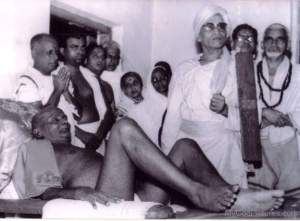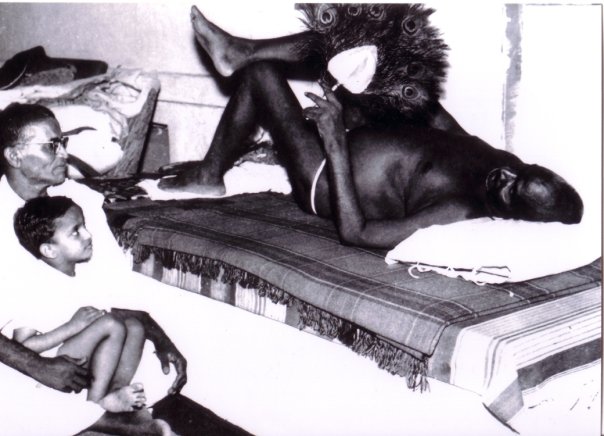Shri Sitaram Shenoy
(This biography was drawn in the early 1960s)

In a part of Bombay City, where the majority of the population is drawn from labor and mostly illiterate, Shri Sitaram Chardappa Shenoy dedicated his life to their upliftment. Born on 4th May 1898 in a small village, Mulki in South Kanara (Karnataka), he had four brothers, Venkatesh, Vitthal, Raghunath, and Ramkrishna, and one sister, Gulabi. His father, Shri Chardappa Anant Shenoy, and mother, Smt. Laxmibai (second daughter of Shri Ganapati Gopal Kamath of Mulki), along with his grandfather Anant Shenoy, lived in Padubidri, some 16 kilometers from Mulki.

Shree Sitaram Shenoy’s family with Bhagavan Nityananda in his home at Banaman Lane, Mumbai
Sitaram began his working life in Solapur at the age of fifteen, but the opportunities in Bombay soon drew him to the city, where he established his permanent residence. His dedication and perseverance won him a permanent place in the hearts of all who worked and lived with him.
The Shenoys were part of a large joint Hindu family, living with many relatives under one roof. This close-knit arrangement had both advantages and disadvantages. A significant disadvantage was the frequent conflicts among the women of the house, particularly between mothers-in-law and daughters-in-law. Sitaram’s wife did not get along with his mother, both being very headstrong.

Bhagavan Nityananda garlanded Ratnakar, son of Shree Sitaram Shenoy
In a fit of anger, Sitaram’s mother left their Mumbai house and returned to her native town of Padubidri in South Karnataka state. Sitaram could not persuade her to return, leading to a rift between them, and they stopped speaking to each other.

Bhagavan Nityananda during His visit to the home of Shree Sitaram Shenoy
Sitaram had a long-standing spiritual desire to build a house near his Guru, Baba Nityananda. During the late 1920s – 1930s, Baba Nityananda stayed at Vajreswari, about a kilometre from Ganeshpuri, sitting opposite the Vajreswari Temple where the Samadhi Shrines (tombs) of several saints of the Natha lineage were located.
Baba recommended this sacred place for Sitaram to build his house. Sitaram leased the land from the Trustees of Vajreswari temple, and Baba had moved his ashram to Ganeshpuri. With great devotion, Sitaram decided to build a house and a motel with lodging and boarding for devotees visiting Ganeshpuri. He visited Ganeshpuri to invite Baba for the Bhumipujan (groundbreaking) ceremony. Baba was then living in the old Ganeshpuri ashram, called Vaikuntha.

Wedding of Ratnakar Shenoy presided by Bhagavan Nityananda
Before beginning construction, Sitaram prostrated himself before Baba and said, “Dear Deva, I have decided to construct my house and hotel as per your recommendation, opposite the Vajreswari Temple. I have one desire: that you, as my Guru, should grace the ceremony of Bhumipujan.” Baba replied, “Go get your mother and ask her to grace the ceremony.” However, Sitaram, driven by his ego and stubbornness, refused. He considered Baba as his true mother and argued, “You are my God, my Mother, my Guru, and my everything. None other than you can grace this great event in my life.”
Baba, unwavering, insisted, “Only your mother should be given this honor.” Sitaram retorted, “I will not go and surrender to my mother. If you do not accept my invitation to grace this ceremony, I shall still hold it, keeping your photographs at the ceremony and offering my respect to you alone.” He left Ganeshpuri in a huff.

Mr & Mrs H. Devrai Pai, in-laws of Ratnakar Shenoy
This interaction underscored the deep, complex relationship between Sitaram and Baba. Sitaram’s devotion allowed him to challenge Baba, whom he considered his everything. Baba’s immense love for Sitaram tolerated his outbursts, aiming to teach him a profound spiritual lesson: the importance of humility and the foundational respect for one’s mother. Baba sought to dissolve Sitaram’s ego and heal the spiritual rift caused by his estrangement from his mother.
The following day, Sitaram commenced the groundbreaking ceremony, invoking Baba’s blessings through his photograph. However, the constructed walls collapsed repeatedly over three consecutive days. Realizing his mistake, Sitaram returned to Ganeshpuri, prostrated at Baba’s feet, and sought forgiveness.

Mr & Mrs. Sitaram Shenoy
Baba, with a loving laugh, explained, “Mother is the Primary Guru. Only with her consent and blessings can one progress spiritually and worldly. If your mother is hurt, no amount of penance can bring success. You must first pay respect to your mother. Now, continue building your house, but for the housewarming (Graha Pravesh), invite your mother with great respect and honor. Wash her feet, offer her a new sari, and begin your life in your new home with her blessings.”
Sitaram completed his house and honored his mother by bringing her to Vajreswari, seating her in the center of the house, performing her padapooja, gifting her a saree, and prostrating at her feet. He viewed her as Baba’s representative and gave her full honor, thereby bringing positive energy into his home. From that day, Sitaram treated his mother like God, establishing a family tradition of daily performing pada puja and bowing to one’s mother.

Raghunath Shenoy, brother of Shree Sitaram, with folded hands near Baba’s head.
This incident beautifully illustrates the deep spiritual truth that respecting one’s parents, especially the mother, is essential for spiritual progress and success. Sitaram’s journey teaches the importance of humility, dissolving the ego, and the transformative power of sincere devotion and respect.

Shree Sitaram Shenoy standing on the left of Bhagavan Nityananda




There are 8 comments on this post
Matru Devo Bhava
Jai Gurudev
Thank you Shri Jayaram Shenoyji for visiting our site and leaving your feedback.
In His Prem,
At His Lotus Feet,
I remain
Gopalkrishna
How deep is mother's love that our Baba was so careful to make a point of it.
Please tel me dear Shri Gopalkrishna, can we ever understand the real meaning, nature, the essence and importance of this relation?
What you say is true. But whatever we understand at this moment, we need to move forward. As we progress, it will all reveal all by itself by His Grace.
How deep is mother's love that our Baba was so careful to make a point of it.
Please tel me dear Shri Gopalkrishna, can we ever understand the real meaning, nature, the essence and importance of this relation?
Dear Jyotsnaji,
My Namaskara to Gurudeva. My namaskara to you.
It is indeed very easy and yet very difficult to comprehend, inculcate and sustain His teachings. Love alone transforms.All mediation, pranayam, scriptures, excercises mean very little unless you stand on the platform of Bhakti. We are all normal human brins, with our samskaras, vasanas, purvasachit, and karma. It is not easy to break free. It is only Guru Krupa alone that can facilitate breaking from all these bondages'. For that we must keep certain Abhyaslike daily reading some scriptures, performing nityakarma, following Dharma, Atmachintan, contemplation on what is heard and read on spiritualism, satsangh, etc. These are the tools to develop love for Him. If we take two steps, He will take 10 steps to reach out and guide.
In His Prem,
Gopalkrishna
Hi,
Few years ago I visited a hotel right in front of temple’s staircase. The owner was Shenoy. Is this the same one? Hotel’s name was also Nityanand.
We have hotels in Vajreshwari and in Mumbai at Sandhurst Road, Dongri.